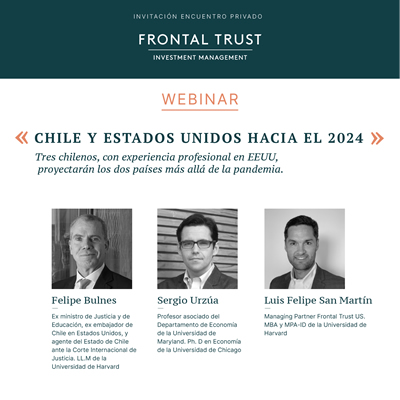“Chile by 2024 and its relationship with the United States” with Felipe Bulnes and Sergio Urzúa

On Friday, June 19, the fourth Frontal Trust webinar was held, named “Chile by 2024 and its relationship with the United States. Three Chilean professionals, with experience in North America, forecasted the two countries beyond the pandemic.” The event counted with the participation of the economist Sergio Urzúa, associate professor at the Economics Department at University of Maryland, and Felipe Bulnes, former minister of state and former Chilean ambassador to the United States, who spoke for over an hour with Luis Felipe San Martín, managing partner of Frontal Trust in Miami.
The three Chilean speakers, who have developed an important part of their professional and academic careers in the United States, addressed the political, economic and social situation of both countries, considering the pandemic situation that the world is experiencing, and forecasted different scenarios, facing 2024.
With an audience of more than 200 people, Sergio Urzúa referred to the constitutional reform project presented by the Government, which empowers the Central Bank to buy debt instruments issued by the Treasury in the open secondary market. “With some concern, I have seen that the best justification for the decision the Central Bank is making is to say that the rest of the developed countries do so. That arises doubts for me because the Central Bank of Chile is an example in the region, but it is not the Federal Reserve, since it has to be concerned about the exchange rate. ”
He added that “to think that one can do things to resemble developed countries seems not very serious to me. From a technical point of view, I do not see the justification for the measure. Long-term rates have been falling and there is clearly no liquidity problem. For some time the Central Bank stopped issuing long-term papers, therefore, there is a problem in moving monetary policy in the long term, which I understand is what is sought with this. A country with an open economy does not control long rates. I cannot find a basis in this decision. ”
Felipe Bulnes, for his part, expressed his concern about what had been happening since October, before the pandemic, “where a successive and disorganized political pressure generated the adoption of measures that increased spending and did not necessarily address the problems that had to be looked into.
Bulnes added that today, more than ever, it is urgent to review social spending. “It is important that the political system behaves responsibly and does not continue to generate pressure on spending, seeking to serve different groups or factors of interest. I am referring, for example, to proposals such as write-off the CAE, which means an immense expense on the fiscal burden and, therefore, a wrong policy. This is not the direction where we have to focus on. I hope that fiscal prudence prevails; that it is understood that we have a very restricted margin of discretion, so that the political pact needs to include the understanding that it is important to react to the extraordinary circumstances we are going through ”.
The former minister also commented the free education issue, noting that Chile has begun to structure an intelligent system, with scholarships and credits, in which the student only paid based on his income, in a maximum percentage, according to the type of credit, and that after a certain time the debt was extinguished. Furthermore, there was no charge during the period of unemployment. “As a result of ideological biases, we ended up establishing free education, even reaching 100%, which is an unfortunate public policy. We ended up investing resources in circumstances that could have resulted in a combination of public and private efforts. But we already have a burden very difficult to settle. We must be very disciplined in how we spend our resources. ”
After an hour of conversation, and after analyzing in-depth the economic and health situation of both countries in times of pandemic, and projecting the opportunities that are emerging due to the crisis, the three professionals concluded that the institutionality of the United States is much stronger than that of many first world countries, a situation that will not change with the new world order. Therefore, beyond the social crisis that affects the United States today and the criticism aroused by the agenda of the current president, Donald Trump, the country remains a safe and interesting place to invest.
